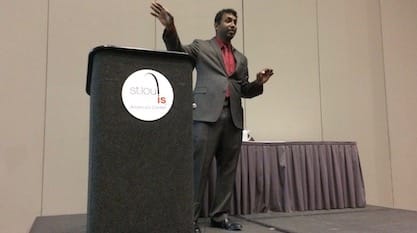 Culture & Ethics
Culture & Ethics
 Faith & Science
Faith & Science
Darwin, Racism, and Eugenics in Detroit

Last week I participated in a stimulating panel discussion on Darwin, scientific racism, and eugenics at the Charles Wright Museum of African American History in Detroit. Other participants included distinguished evolutionary biologist Morris Goodman of Wayne State University, historian Damon Salesa of the University of Michigan, and biology professor Jerry Bergman of Northwest State College in Ohio. The moderator was author and broadcast journalist Edward Foxworth. The Charles Wright Museum is the world’s largest institution devoted to the subject of African American history, and it’s well worth a visit.
The museum’s presentation of the African American experience is outstanding; its galleries place you in the very midst of history, including a slave ship, plantation life, and early twentieth century Detroit.
The evening’s event was serious, thoughtful—and civil.
Drs. Salesa and Goodman were a credit to the Darwin side of the debate, and they both made thoughtful points throughout. Their main arguments seemed to be (1) there were a lot of other racists before and after Darwin, (2) Darwin himself was an opponent of slavery (and less racist than many of his era), (3) every idea can be misused, and (4) science has moved beyond scientific racism and eugenics. I actually agree with these points, as I made clear at the event. The point I tried to make was not that Darwin was the world’s first or worst racist (he wasn’t), but that he gave racism a powerful boost in the scientific community by appearing to give it a convincing scientific rationale. Despite his personal opposition to slavery, Darwin clearly believed that natural selection working on different populations produced “higher” and “lower” races with different mental capacities. Hence, according to Darwinian theory, one should expect to find races with unequal capacities. This expectation of Darwinian theory helped fuel scientific racism for decades and provided a research agenda for a number of leading evolutionary biologists, most notably National Academy of Sciences’ member Charles Davenport, one of the founding fathers of modern genetics.
The Darwinian connection to the eugenics movement was even more direct. Darwin thought that human beings and their capacities only arose through a merciless process of natural selection that ruthlessly exterminated the weak and the inferior. But according to Darwin, civilized societies did their best to counteract natural selection and preserve those nature would have killed off. Darwin thought that this counteracting of natural selection had serious negative consequences for the future of the human race. As he put it, “excepting in the case of man himself, hardly anyone is so ignorant as to allow his worst animals to breed.” Given this predicament, one had two choices as a Darwinist: advocate a return to the law of the jungle in human society, or try to institute a “kinder, gentler” form of selection through science. The latter option was the one championed by eugenists because they thought it was more humane than the first option, but both options grew out of a thoroughly Darwinian rationale.
I emphasized that that Darwinian justifications for racism and eugenics were not merely fringe ideas adopted by a few quack scientists. They were ideas embraced and advocated by America’s leading evolutionary biologists during the first several decades of the twentieth century, scientists at such august institutions as Harvard, Princeton, Columbia, Stanford, and the National Academy of Sciences. These ideas became the consensus view of the scientific community for several decades. The scientific community’s wrong-headed embrace of Darwinian racism and eugenics supplies a cautionary lesson for why it is a good thing in a free society for people to be able to debate the evidence for scientific ideas as well as the implications of those ideas. Scientists are just as fallible as other human beings, and it is healthy to allow people to question the scientific consensus, because the consensus may be wrong.
For more on the debate over Darwin’s influence on racism and eugenics, check out my book Darwin Day in America or the online debate “Was Charles Darwin a ‘Social Darwinist’?”
